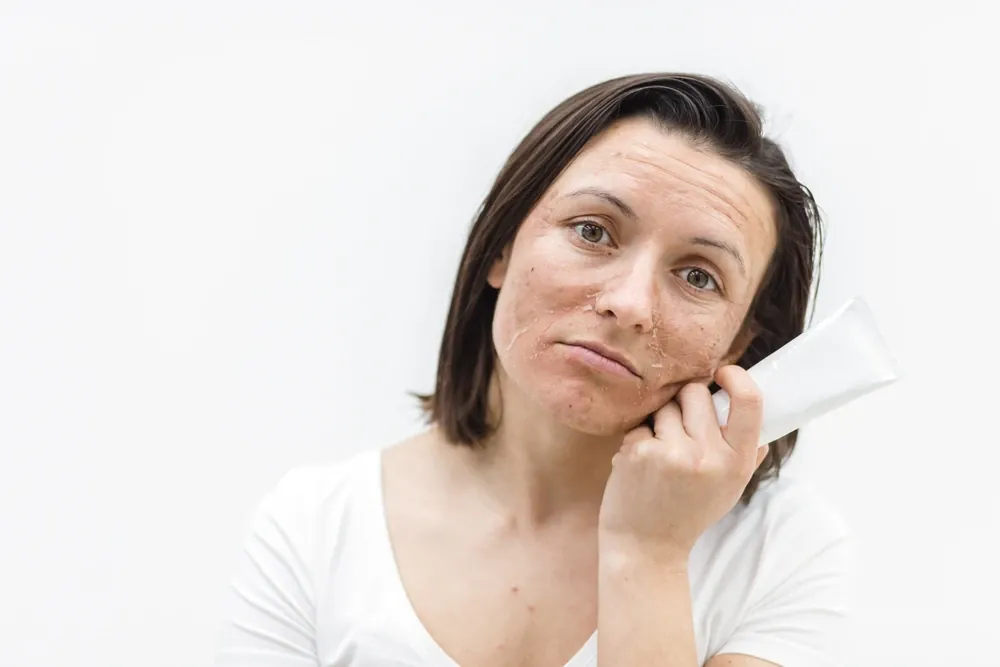Dry skin is one of the most common skin conditions. It is a common problem that affects many people of different ages. It causes a rough appearance and harsh texture, with a feeling of itching and sometimes soreness.
The skin is considered the largest organ in the human body and plays a vital role in protecting the body and maintaining its balance. However, various environmental factors can hurt the skin, such as very dry weather and extreme heat, as well as the use of harsh chemical products, and a lack of hydration leads to dry skin.
Causes of dry skin:
1. Various environmental factors: such as cold and dry weather, low humidity, exposure to intense sunlight, and strong winds, all of these factors cause moisture loss from the skin.
2. Frequent showering: especially with hot water or using strong soap.
3. Use of certain products: such as many care products that contain alcohol or harsh chemicals.
4. Some medical conditions: Some medical conditions cause dry skin, such as atopic dermatitis (eczema), psoriasis, and diabetes.
5. Aging: As we age, the skin becomes less able to retain moisture.
6. Some medications: such as diuretics and some acne treatment medications.
Symptoms of dry skin:
Symptoms of dry skin vary from person to person and include:
- Roughness of the skin: The skin texture appears dry and rough to the touch.
- The appearance of cracks in the skin: The skin becomes more susceptible to cracks, especially the hands and feet.
- A feeling of itching and tightness in the skin: A person may feel itching, especially after showering or in cold weather.
- Peeling of the skin: The skin may peel, especially on the hands and feet.
- Redness and burning of the skin: Burning of the skin may occur or some redness may appear on the skin.
- Feeling skin irritation: The skin may become more sensitive to some products, such as soap and skin care products.
Methods of prevention and treatment:
- Moisturizing the skin: Moisturizing is the most important step in treating dry skin, as moisturizing creams should be used daily, especially after showering, which contributes to restoring the natural moisture balance in the skin.
- Choose gentle skin care products: Using gentle skin care products that are free of perfumes, dyes, and harmful chemicals can reduce skin irritation and dryness.
- Bathing with warm water: You should avoid bathing with hot water, and use warm water instead.
- Drink enough water: You should drink at least 8 cups of water daily to keep the body hydrated.
- Use an air humidifier: An air humidifier may help add moisture to the air, especially in the winter.
- Avoid irritating factors: Factors that lead to skin irritation should be avoided, such as strong soaps and care products that contain alcohol or harsh chemicals.
- Follow a healthy diet: Eating foods rich in vitamins and minerals such as omega-3 and vitamins A and E can help improve skin health.
- Consult a doctor: If dry skin is severe or does not improve with home treatment, you must obtain medical advice, as the symptoms of dry skin and its treatment may differ from one person to another. It is also recommended to consult a dermatologist before using any new skincare products.
Dry skin is not only an aesthetic problem, it can affect comfort and overall health, but by following a healthy lifestyle and using the right products, you can reduce the risk of dry skin and keep the skin healthy and clear.
Goodbye to dry skin and hello to healthy and smooth skin
 English
English
 العربية
العربية


Add New Comment